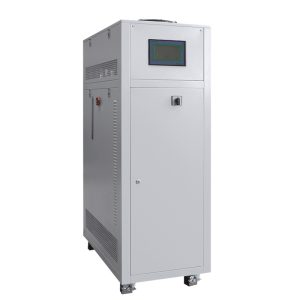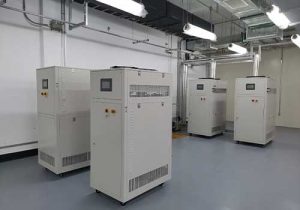refrigerant chiller system
Refrigerant Chiller Systems: Efficient Cooling for Diverse Applications
Refrigerant chiller systems are critical components in many industries and commercial facilities where precise temperature control is essential. These systems operate on well-established thermodynamic principles, providing reliable cooling through a cycle of heat absorption and release. The use of refrigerant chiller systems spans a variety of applications, from industrial processes to commercial building climate control.

How Refrigerant Chiller Systems Work
Refrigerant chiller systems function based on the principles of the vapor compression cycle, which includes four main steps: compression, condensation, expansion, and evaporation. The compressor, often referred to as the heart of the chiller system, increases the temperature and pressure of the refrigerant vapor, facilitating efficient heat transfer. The high-temperature, high-pressure vapor then flows into a condenser, where it releases heat to the surrounding environment, transforming into a high-pressure liquid.
This liquid refrigerant then moves through an expansion valve, which rapidly reduces its pressure and temperature. The low-pressure, low-temperature liquid enters the evaporator, where it absorbs heat from the area or substance being cooled, evaporating back into a vapor and providing the desired cooling effect.
Types of Refrigerant Chiller Systems

Refrigerant chiller systems can be classified into two main types based on the condenser cooling medium: air-cooled and water-cooled.
Air-Cooled Chillers: These systems use ambient air to dissipate heat from the refrigerant. They are self-contained units with a condenser coil, compressor, and evaporator all housed within a single package. Air-cooled chillers are simpler to install and maintain due to the absence of a separate cooling tower or water source.
Water-Cooled Chillers: These systems use water to absorb heat from the refrigerant in the evaporator and then release this heat through a cooling tower. Water-cooled chillers are known for their efficiency, consistency, and longevity but require water treatment for the cooling tower.
Applications of Refrigerant Chiller Systems
Refrigerant chiller systems are used in a wide range of applications, including:
Commercial Buildings: Chillers provide cooling for large buildings such as shopping malls, office complexes, and hotels, managing the temperature of HVAC systems to ensure a comfortable environment for occupants.
Industrial Processes: In manufacturing and processing facilities, chillers help regulate the temperature of production lines, cooling systems, and critical equipment, ensuring smooth operation and preventing overheating.

Market Trends and Growth Drivers
The global market for chillers is expected to grow at a CAGR of 2.8% from 2022 to 2032, reaching a valuation of $5.5 billion by the end of 2032. The demand for chillers is driven by the need for cooling equipment in industrial units, the increasing requirement for cooling in the face of global warming, and the growing demand for green construction initiatives.
The market is also influenced by the growing awareness of energy-efficient products and the rising demand for frozen foods, which has led to the use of process chillers in the frozen food space.
Challenges and Future Prospects
Refrigerant chiller systems face challenges such as the need for high initial investment and the requirement for advanced technology to manage operations in diverse environmental conditions. However, ongoing research and development are addressing these issues, with a focus on improving system efficiency and reducing costs.
In conclusion, refrigerant chiller systems are indispensable in providing efficient cooling solutions for a variety of applications. Their versatility, efficiency, and reliability make them an attractive option for various industries. As the global market for chillers continues to grow, driven by energy efficiency trends and sustainability concerns, these systems are expected to play a significant role in meeting the cooling demands of a rapidly changing world.
Related recommendations
Refrigeration and Heating System Installation
1579Refrigeration and Heating System Installation Installation method of refrigeration and heating system Pay attention to the dust and impurities in the refrigerant pipeline during the ins...
View detailsglycol air cooler
598Glycol Air Cooler: Efficient Low-Temperature Cooling Systems Glycol air coolers are specialized HVAC units designed to cater to cooling needs in environments where temperatures may drop signifi...
View detailschiller coolers
391Chiller coolers, also simply referred to as chillers, are essential mechanical systems designed to remove heat from a substance, typically water or a refrigerant, and transfer it to another medium...
View detailsChiller Classification and Analysis of Advantages and Disadvantages
1299Chiller Classification and Analysis of Advantages and Disadvantages Chillers have many titles in the industry, including chillers, industrial chillers, screw chillers, scroll chillers, compa...
View details
 LNEYA Chiller
LNEYA Chiller







HelloPlease log in